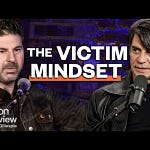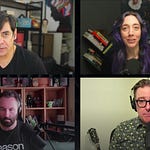Does anyone else remember the old 7-11 ad campaign about ‘freedom of choice’? It was probably in the 1980s but the convenience store chain was promoting the fact that it allowed customers to get fountain versions of both Coke and Pepsi products. Implicit in the pitch—and in political campaigns about everything from school choice to reproductive rights—is the seemingly self-evident idea that more choices equals more freedom.
Today’s guest, University of Pennsylvania historian Sophia Rosenfeld and the author of The Age of Choice: A History of Freedom in Modern Life, complicates the easy equation of more choice with more freedom. Her book stresses it wasn't always this way—in the past, freedom was often defined as the ability to act in the way God wanted you to act, or to overcome base urges, to be more angel than beast.
Rosenfeld talks about how the Reformation, which enshrined a right to choose among faiths, and the rise of shopping, which allowed us to choose among many products, worked to change all that, even up to our current day, where rhetoric about choice still dominates so many political and economic arguments. We also talk about whether too much choice overwhelms our ability to act (I argue against such an idea in The Agony of Abundance).
As the editor of a best-of-Reason-magazine anthology called Choice, I generally believe that having more choices—more options, more ways of being in the world—is a good thing. And I instinctively recoil from coercive attempts to limit people’s choices—of what to eat, what to smoke, who to marry, where to live, where to build, how to operate a business—as a form of tyranny. But it’s worth thinking about the context in which choices get made (all choices are bounded in some way, Rosenfeld stresses), and how the modern equation of freedom and choice came into being.
It’s also worth thinking about whether consumer choice is more than an illusion used to reduce social tensions. Does having, say, dozens of types of toothpaste really increase freedom, or is it a way of making people think they live in a world of meaningful options? It’s important to make the case for choice, I think, especially in a world where the left wants to limit certain choices (often economic ones) and the right wants to limit others (often cultural ones). Defending choice, whether trivial or profound, is central to the libertarian project. As Hayek wrote, ‘To live and work successfully with others requires more than faithfulness to one’s concrete aims. It requires an intellectual commitment to a type of order in which, even on issues which to one are fundamental, others are allowed to pursue different ends.’
Here are chapter headings. Below that are links to YouTube, Spotify, Apple, and Soundcloud versions.
0:00—Intro
1:15—Main arguments from The Age of Choice
4:03—Earlier conceptions of freedom
7:37—The Reformation and religious freedom
10:32—Capitalism and market freedom
15:37—Consumer choice and femininity
20:00—Choice as freedom in the 20th century
26:07—Abortion rights and the choice debate
31:26—Choices vs. mandates
36:50—Overwhelmed by choice
If you like what I’m posting here, please subscribe and share! And check out Reason, the planet’s leading source of politics, culture, and ideas from a principled libertarian angle.











Share this post